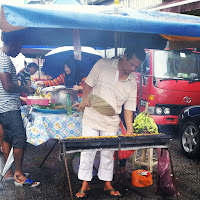 |
Walking down Petaling Street |
Oh the smells of steaming noodles,
the smoke of spicy barbecue and wafts of freshly baked bread! The crowds of
people, some hurrying past clutching pungent bags of durian and seafood! The laughter of children! The cats running through the stalls! The sounds of haggling, vendors
offering samples, and someone singing acappella in the background! There’s
nothing quite like the night market atmosphere!
 |
Satay vendor |
One
of places I loved going to were the night
markets in KL. Called Pasar Malam in Malay (Pasar=Market, Malam=Night), Night markets
are a large part of Southeast Asian culture. Locals would meet at these markets to
eat, hang out, gossip and shop from the late afternoon to night. I found this puzzling at first, but it made sense once I actually experienced the outside temperature in KL during the day. It was too hot and humid for anyone to want to do much outside until sunset when the temperature finally cooled off.
 |
Pao (baozi 包子in Mandarin or siopao in Filipino).The "Mr. Black," taro with milk filling, is the best kind! |
Similar to bazaars, the vendors at these night markets offer a variety of goods and services such as shoe shining and electronic repairs.I
especially loved coming here to sample street foods and stock up on supplies
for the week. For what would cost me about about twenty five dollars’at a grocery store,
I could get the same amount of food (and more fresh) for less than eight dollars at the night market (including fruits,
veggies, breads and other snacks I would need to get me through the week
ahead)!
 |
Veggie Vendor |
A
note about haggling – it doesn’t hurt to try! The more you practice, the better
you will become. Also, most vendors are super willing to work with you despite
possible language barriers, and they love if you can speak a bit of their language.
Being of mixed heritage myself, though, I feel that I had a different experience from my other classmates as I could pass as looking either Malay, Chinese or
Indian depending on the vendor. Some locals expected me to speak their language off
the bat, and were shocked when I had to revert to speaking English,...My American accent was a dead giveaway…I made it a point to try to learn as much Malay as I could. I learned to at least count up to seven by
the end of the trip! One other thing that helped me was having some working knowledge of Mandarin, which
helped with Chinese vendors when I couldn’t understand their accent when
speaking English. Most of the Chinese I talked to, however, spoke Cantonese,
and I feel that a Cantonese speaker would have no problems at all here.
 |
People line up to drink pure sugar cane juice?? |
In addition, I learned that it's best to try to establish a relationship with one vendor. Not only would that vendor appreciate your service, but they are also more likely to remember you and throw in a few free treats every now and then. I would often come to the same pao (see pic above) vendor to fill my pao craving. One time when I was out of change, my favorite pao vendor told me to pay him back next week, which was super sweet.
 |
Snacks |
There are many different night markets located throughout KL, some only appearing on certain days of the week. There’s a nice one that would open at 5pm on Sundays by Taman Paramount (LRT station), There's a big one also every Sunday at 5pm in Bangsar that catering to expats (expect to see tons of Europeans).
 |
A "wet" market |
Central Market (good for souvenirs and has a decent cheap food court) and Petaling Street next to it (good for knock off handbags and accessories) are open every day all day until 10pm-ish. There are also “wet markets,” which are markets that sell the same produce as night markets, but have wet floors from the vendors.

This one was also by me!
ReplyDeleteStephanie Simpson
livingbetweenthelines.org